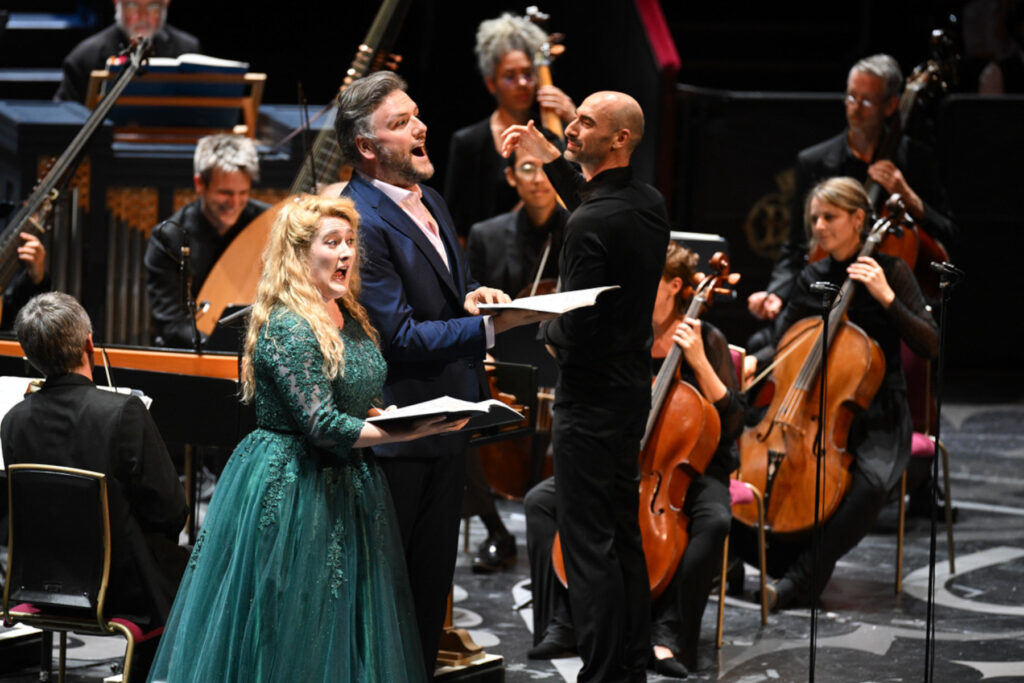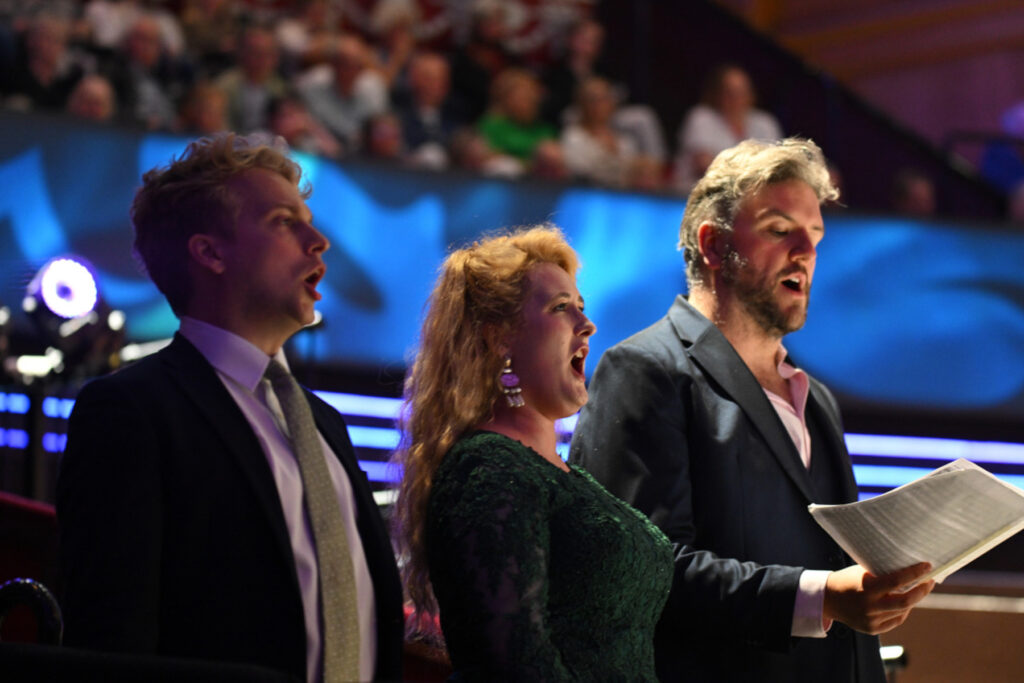Performances of Handel’s Alexander’s Feast don’t come along too often; much less the Dublin version of 1742, meticulously recreated here by Peter Whelan, the conductor/director of Irish Baroque, and Donald Burrows. Whelan took musicology as a bedrock, but made decisions around that. Burrows also discovered a basso continuo part at the Royal College of Music (just across the road from the RAH) for a missing air from part III (the Dublin version is in three parts, the better-known Covent Garden version in two). The first solo aria of the third part, ‘Your voices tune,’ was long missing; combining the text from the Dublin workbook (and comparing it with another setting Handel made of the same text) resulted in what we heard, by Whelan’s admission ‘an approximate reconstruction’. But that’s what musicology is all about when historical distance is involved; and this is a pure example of living musicology.
Many readers of a certain age will, like myself, have grown up with the Philip Ledger HMV recording of Alexander’s Feast, with the English Chamber Orchestra, the Choir of King’s College, Cambridge and a crack team of soloists including Helen Donath, Sally Burgess, Robert Tear, and Thomas Allan. How good to hear it here, a perfect choice for a Pro.

So, a Proms Handel premiere (of a performing version, plus an air); and a concert boasting only the second Proms appearance by an ensemble from the Republic of Ireland ever at the Proms. The previous one was in the late 1970’s, the New Irish Chamber Orchestra.
The setting for Handel’s HWV 75 is that Alexander the Great has defeated King Darius; the piece is set at a victory banquet. Timotheus stirs Alexander’s emotions: pride, envy, and love for the beautiful Thaïs. Soloists are narrators (as opposed to dramatic characters).
Talking of nostalgia and that HMV version, it was tradition to insert some pieces during the course of a performance, and here we enjoyed movements from Handel’s Concerti a due cori (two choruses, although one might be forgiven for thinking it means concertos for two horns, given the prominence of that instrument). The second part began with the Concerto a due cori in F-Major, HWV 333 (which Sir Charles Mackerras featured on a famous disc that also included a massed-band performance of the Music for the Royal Fireworks with the London Symphony Orchestra).

All soloists entered at the opening to a rousing cheer, but Cutting made a swift exit as the opening aria is for tenor and soprano; throughout, soloists entered from the wings in the opening orchestral ritornelli (sometimes, if that introduction was short, rather rapidly).
But it was the Overture that set the stall: rapid-fire, clipped, with proper double-dots in the slower, ceremonial opening. The sound was superbly balanced (interestingly, the brilliant scalic organ contribution from Malcolm Proud right at the end, is significantly closer on the broadcast thanks to the BBC miking). Throughout, the orchestra was stunning, hardly missing a beat. Phrasing felt perfectly judged throughout; this reading is clearly the result of much thought on Whelan’s side. I have previously loved his work at Covent Garden’s Linbury Theatre in Vivaldi (Bajazet in 2021, and L’Olimpiade in 2024). There is much special work going on here; excavatory, yes, but the results always seem to be jewels.
Here at the Royal Albert Hall were three fine soloists, although it was Cronin and Cutting that really shone. Hilary Cronin’s soprano glistened in her opening recitative, ‘’Twas at the royal feast,’ purer than tenor Stuart Jackson’s rather unsteady, quick vibrato for ‘Happy, happy, happy pair!’ (things did settle somewhat). And Cronin’s ‘With ravish’d ears’ showed an easy top register and phenomenally smooth melismas; how effective, too, the voice/violin ‘echoes’.
When Bacchus (metaphorically) enters, things get rather more raucous with the paean to alcohol, ‘Bacchus, ever fair and young / Drinking joys did first ordain’. It features four horns (split – no pun intended – into two, antiphonally placed here and superbly played). This is for tenor in the 1742 version (adherents of the 1736 Covent Garden version may remember this as bass); the horns blend in beautifully with the chorus, too.
The counter-tenor accompanied recitative ‘He sung Darius great and good’ was delivered with characteristic plangency, pureness of tone and expression by Hugh Cutting. A voice/violin (solo violin here) dialogue is again deployed by Handel as if a silken thread through the piece; while Handel’s use of choral counterpoint in this section here prepares us for some of the great fugal writing later. Cutting’s arioso, ‘Softly sweet, in Lydian measures’ offered another opportunity for the solo violin of Huw Daniel; Handel at his most tender, offering contrast with the tenor, ‘War, he sung, is toil and trouble’; Jackson could have given more here. Nice to hear both harpsichord and organ as part of the orchestral tapestry, though.
As to the choir, the Irish Baroque Chorus, they were exceptional. It was the sopranos that impressed in their first outing, ‘The listening crowd admire the lofty sound’ (and how effective the Irish BO’s pianississimo at the end, a moment of real hush). The choir’s ability to create lightness was writ large in the beautiful ‘Behold, Darius, great and good’; the mighty chorus close to the end of Part I, ‘The many rend the skies’. And how gorgeous the chorus, ‘At last divine Cecilia came’ (complete with fugue; as was ‘Let old Timotheus yield the price’).
A bit of advertising going on in this concert, but in a good way. Handel’s Concerto a due cori, HWV 333 uses a chorus from Messiah as its third movement; the encore was the ‘Hallelujah’ chorus (and yes, some people stood). In 2026, the Irish Baroque Chorus and Orchestra release a new recoding of Messiah …. anyway, inserting pieces at this point is historically accurate, and what a piece to add (later, we had more inserts of movements from Concerti a due cori). We had four of the six movements of HWV 333 at the beginning; interestingly, the first horn played the very same flourish at the opening as the player in the Mackerras version (to hear it straight, head to the Academy of Ancient Music and Hogwood, for example). After a stately Pomposo, an Allego absolutely shot through with energy (had they been on the Red Bull – other energy drinks are available – at the interval?). Then the transcription of ‘Lift up you heads, O ye gates’ before a stunningly beautiful Largo ceding to preternaturally together violins for ‘Now strike the golden lyre again’ as Handel takes up the ‘action’. The duet (Jackson and Cutting) ‘Revenge, revenge, Timotheus cries,’ found Jackson a little weak; Cutting seul for the remarkable ‘Give the vengeance due’ was full of power, though, and how accurate the band in their rapid-fire three-note anacrusis.
It was the fifth movement of HWV 333 that acted as an ‘interlude’ between Parts II and III (and implicitly the conclusion of II), the string rhythmic unisons nicely resolute against the woodwind activity. An Allegro from HWV 334 (another Concerto a due cori in F; the finale – it wasn’t specified which Allegro and there are two), seemed the perfect preparation for the third and final part.
It was the aria for alto, ‘Your voices tune, and arise them high,’ that opened the third part, that reconstructed aria, which opened the work’s final section, Cutting honouring Handel’s legato line perfectly, altering to a more fanfare-like demeanour of ‘blest Cecilia’s name’; it segued beautifully into the chorus ’Your voices tune’.
Sometimes it is a combination of voices that can make one wish there was more of that meeting of registering the piece. Such was the case for the soprano/alto duet ‘Let’s imitate her notes above,’ Cronin and Cutting in perfect accord (perhaps something to do with microphone placement, but this aspect was more evident in the hall than on the broadcast).
The final chorus, to those same words, was the perfect close; just the ‘Hallelujah’ to go, with laughter form the audience in recognition. The performance boded well for these forces’ forthcoming recording of Messiah next year; but how satisfying to hear Alexander’s Feast at all, much less with such musicological integrity.
Colin Clarke
Handel’s ‘Alexander’s Feast’ (BBC Proms 2025)
Alexander’s Feast, HWV 75 (1742 version)
Composer: George Frederic Handel
Librettist: John Dryden
Performers:
Hilary Cronin (soprano); Hugh Cutting (counter-tenor); Stuart Jackson (tenor)
Conductor – Peter Whelan; Irish Baroque Chorus & Orchestra
Royal Albert Hall, London, 30 August 2025
All photos © Chris Christodoulou